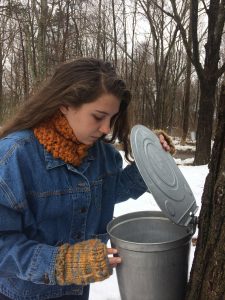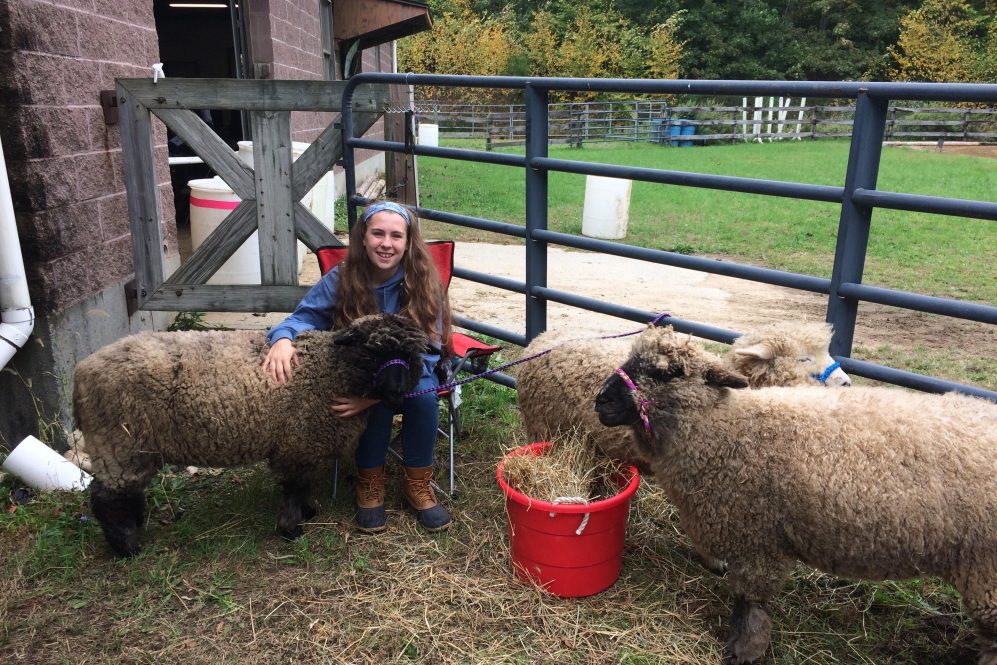Agricultural education and outreach individualized major Sara Tomis ‘22 is promoting agricultural literacy through her extension internships with UConn 4-H New London County, the sustainable landscapes program, and Healthy Homes Connecticut this summer.
Tomis is helping the UConn 4-H New London County Office develop experiential learning kits to distribute at local libraries. Each kit is focused on a different kind of farm, including unconventional farms like bee or wind farms. UConn 4-H New London County hosts a Facebook live event every other week during which children follow along and assemble the activity in the kits to learn about different farming operations and other STEM concepts.
Tomis also works with local summer camps to teach campers about agriculture and the natural world through lessons on topics like metamorphic bugs’ life cycles.
“We’re granting them the ability to experience the world around them through a scientific focus,” Tomis says.
Tomis is also helping the sustainable landscapes program prepare publications that guide landscape professionals across the northeast.
One publication focuses on growing degree days for various pests. Growing degree days are a measure of how many days above a certain temperature it takes an insect to reach a specific developmental stage, such as its larval or adult stage. This information helps landscape professionals target pesticide application. If they know exactly when the pests of concern will be active, they can limit pesticide application to a particular timespan.
“It allows them to have more direct, more effective, and more sustainable pest management practices,” Tomis says.
Tomis is also working with Healthy Homes Connecticut, an extension program that helps people make their homes safe, healthy environments by looking at issues such as indoor air quality, lead poisoning, and mold.
This summer, Healthy Homes Connecticut is collaborating with UConn 4-H to run a series of youth workshops focused on healthy living principles. In particular, the workshop teaches participants how to prepare for natural disasters such as floods or blizzards.

Participants can complete challenges such as assembling a “go-bag” and checklist themself, a family member, pet, or farm animal. These bags include everything needed for three days in an emergency including food, water, and medications.
Tomis is also helping develop a fact sheet about how to maintain proper hygiene around animals, which can be used at UConn 4-H fairs or in barns.
Through her internship experiences, Tomis is crafting education materials for children as young as four years-old to adult professionals and consumers. Each demographic comes with their own needs and challenges for a communicator.
“It really makes you think about your audience,” Tomis says. “Your audience is why you’re doing your outreach. If they can’t access it, it’s not worth anything.”
After graduation, Tomis hopes to continue her career advancing agricultural literacy as an extension or secondary educator, something she realized was a national problem early on.
Originally from Preston, Connecticut, Tomis attended Ledyard High School and was a part of the Ledyard Agri-Science and Technology program. Her experience there inspired a passion for promoting agricultural literacy.
“Agricultural education is not equally accessible,” Tomis says. “And that’s something we need to address ASAP.”
Tomis began working with UConn Extension as a first-year student and has maintained her involvement since.
“I love it so much,” Tomis says. “I love the community interaction and being able to enhance and improve the lives of those around me with my knowledge of agricultural science.”
The College of Agriculture, Health, and Natural Resources’ UConn Extension internships provide students with the opportunity to learn and work in a paid career-oriented role.
Follow UConn CAHNR on social media



